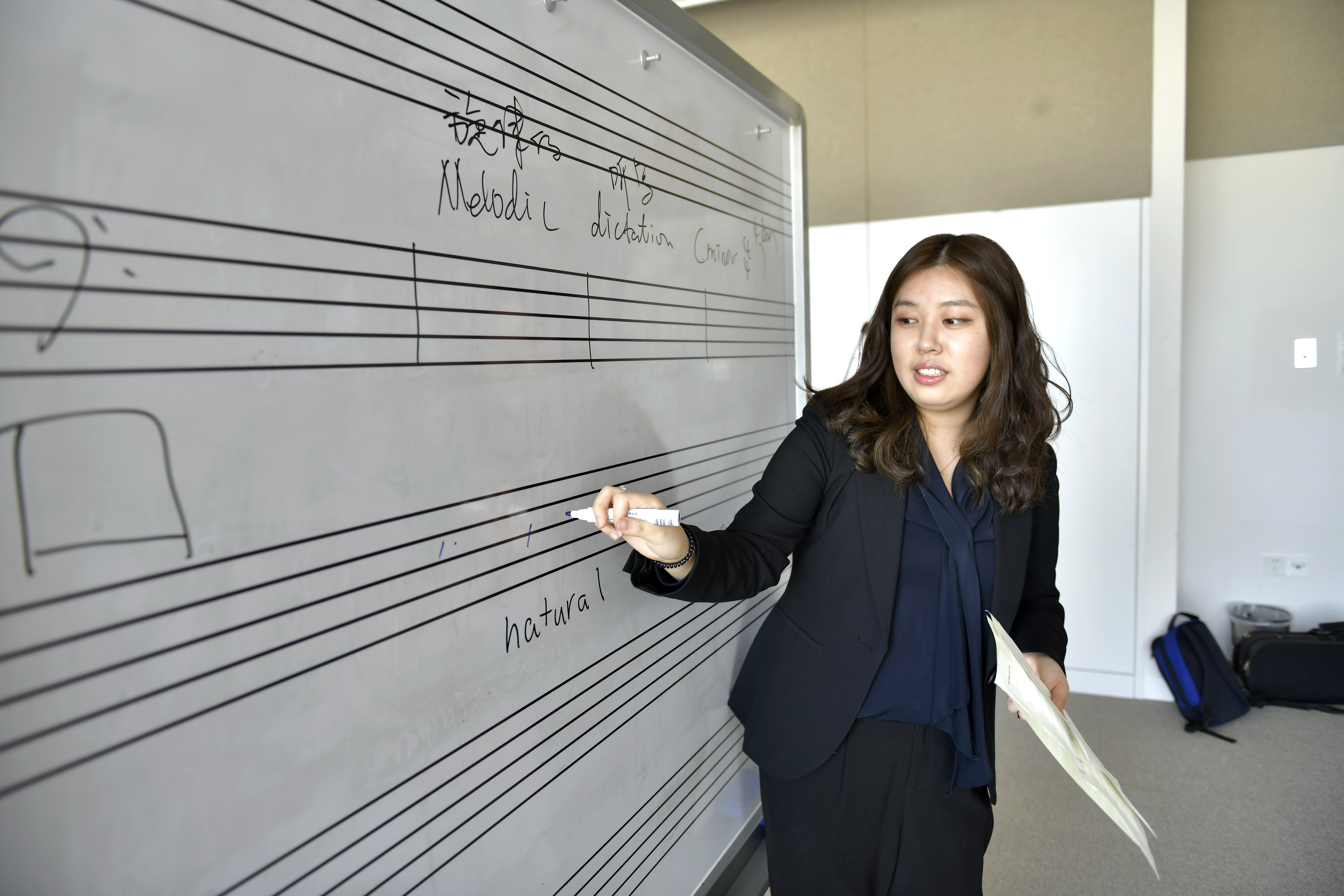As a China-born, Juilliard-trained pianist, I was fortunate to experience the educational systems both in the US and Asia, which helped me tremendously for my work in the Tianjin Juilliard School. In the past 6 years, most of my time was spent in the US where I acquired knowledge and skills, but I think the most important thing that I learnt at Juilliard, is the spirit of creativity and diversity.
To bring it to China, this is not an easy task. However, Tianjin Juilliard is an international community providing a dynamic multicultural environment in Tianjin. I have students with different backgrounds: Local Chinese, Chinese students who studied abroad, as well as students from Europe and the US. After class, I often overhear students talking about their group project, and what they learned from the break-out-room discussion. I am very happy to see their experiences and knowledge merging together and transforming into something new. I always believe that learning should be multi-dimensional.
To bring the Juilliard spirit into my classes, I encourage my students to explore more in music by using the techniques that we cover in the class, which help them find the “creative part” through techniques that they are familiar with. I am always surprised and delighted to see that students are willing to try with great enthusiasm. Once, a student in my piano class played me a piano solo composition that she composed by using the phrase modal that we went through in the class. Sometimes, I get little improvisations from students via email. Those musical moments contain a variety of music interpretations and personalities. I am happy to see their personal voices developing through the life in Tianjin Juilliard, and truly excited to see the little seed planted by Juilliard sprouting here.
Here’s what my week at Tianjin Juilliard is like in terms of activities:
Friday:
When a musician wants to modulate from one tonal center to another, the most classic technique we use is called: “Pivot Point”, which often refers to a chord that exists in two keys. For me, Friday is my “Pivot Point” where I need to shift from Graduate Studies to Pre-College. In the morning, I teach keyboard studies and piano for non-majors. At noon, I have ear training coaching for graduate students who may need extra help on ear training. The afternoon is usually when I spend time geting ready for the Pre-College on Saturday. I need to prepare the class materials of 9 different classes with students of various levels and age groups. I usually tidy up the students’ homework first, tracking the progress of every student. After that, I need to prepare the class materials for Saturday, including designing the class activities, printing out the exercises, and writing different dictations for students to practice.
Saturday:
Saturday is a big day for me. It always requires a huge amount of energy when it comes to group teaching. My first class is at 9am and my last class finishes at 7pm. My youngest student is about 8 years old, and my oldest student is in grade 12, which requires me to adapt as I go into different teaching circumstances in one day. The Pre-College students are mostly Chinese, and it is sometimes difficult to use only English when teaching them. Especially for the younger ones, at times, I need to teach the class bilingually. I usually start with English words, helping them to get familiarized and use these words step by step. The goal for older students in the advanced classes is more comprehensive. They need to obtain new skills in English, and they need to be able to address questions and talk about music in English as well. I need to be fully prepared and know the level of each student very well to be able to customize their studies and class materials. It is very rewarding to see the progress that students make in my class.
When I was at this young age, I took my ear training class in China so I understood the type of training they were used to as well as their limitations. I also took a three-year ear training class with Dr. Blaha in Juilliard. The system in the US is very different from what I had experienced and all these experiences provide me different insights in ear training education. More importantly, I want to encourage the expressive voices of our young students. Questions, thoughts, comments are always welcome. I hope I can help my students to improve through these questions, thoughts, and comments. Sometimes, I present myself as not just a teacher, but a guide as well. It is the happiest thing for me to see the students conquering tasks that they felt were impossible, through learning and practice.
Sunday:
Due to the pandemic, there are some students who are not able to come to Tianjin for the in-person classes. In the morning, I have make-up sessions for students who are not able to make it. In the afternoon, I teach piano lessons for the Music Development Program.
Monday to Friday:
During the weekdays, I teach keyboard studies, sight-reading for pianists, and piano for non-majors, which leaves me very little break time during the week, but I am enjoying it! I love to communicate with students, to hear different points of views, and I also learn a lot through these experiences. It also feels great to go back to the concert hall, where I get to witness the progress that our students have made through the semester.
